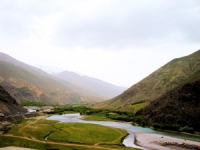Water sharing between Central Asian countries has been conflicting for quite a long time already.
Turkmenistan’s law on hydrocarbon resources amended

The Turkmen law on 'Hydrocarbon Resources' has been amended. According to them, permission from the appropriate authorised state bodies is required to conduct blast operations onshore, offshore, as well as on the seabed, an official Turkmen source said today.
An item in the fourth paragraph of first article 44 of Turkmen law on 'Hydrocarbon Resources', adopted by the Majlis (Parliament) of the country in 2008, is as follows: 'It is forbidden to conduct blasting operations onshore, offshore, as well as on the seabed without the permission of the authorised state bodies'.
Previous changes were made to the law in May 2012. According to the document, the State Agency for Hydrocarbon Resources under the Turkmen president was entitled to set up companies, acquire shares and stocks of other companies and to open branches and representative offices and other units abroad.
More than 1000 prospective oil and gas structures were revealed, more than 150 fields were discovered but only 50 of them are being developed onshore and offshore in the Caspian Sea in Turkmenistan. The virtually undeveloped fields of the Caspian Sea located on the right bank of the Amu Darya are also considered promising throughout the country.
Galkynysh located in the eastern region of Turkmenistan, ranks second on the scale of the world's largest gas reserves. Such large projects as the Trans-Afghan and Trans-Caspian gas pipelines are connected to it.
According to inter-state agreements, the Turkmenistan-China gas pipeline has been built. A pre-Caspian pipeline project is being considered. A radical reconstruction of the Central Asia-Centre gas transportation system is required.
Turkmenistan signed long term agreements on cooperation in the gas sector with Russia, China and Iran. A memorandum of cooperation in the energy sector with the EU has also been signed.




